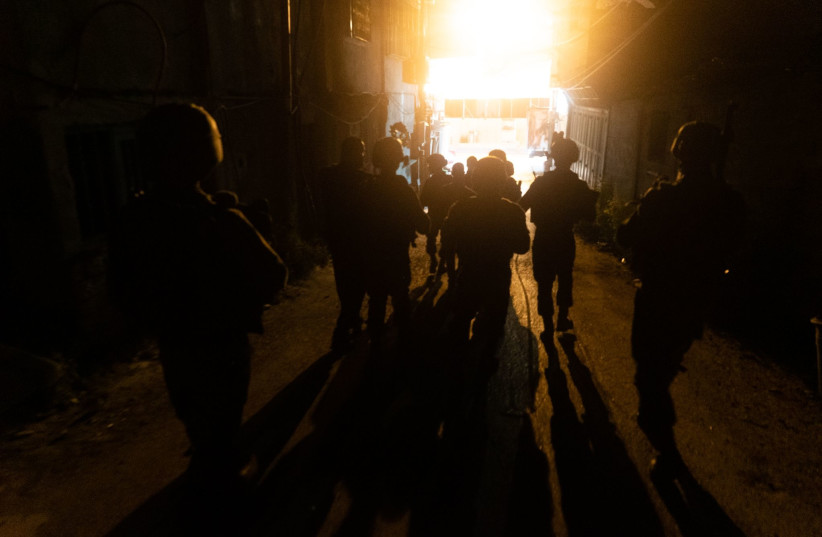Operation Breaking Dawn was conducted properly on both the military and diplomatic levels, but Hamas gained from it on the diplomatic front. That’s according to Maj.-Gen. (res.) Matan Vilnai, the CEO of Commanders for Israel’s Security; a former IDF deputy chief of staff, MK and government minister; and current president of the Israel-Asia Chamber of Commerce.
Israel should be doing all it can to can to weaken Hamas and strengthen the Palestinian Authority so that the PA will eventually gain control of Gaza, Vilnai said in an interview with The Jerusalem Post.
“From a military point of view, this was a very successful operation,” he said. “[But] one must remember that the Islamic Jihad is one of the smallest terrorist organizations that work against us, and cannot stand match us in a serious conflict.
"Islamic Jihad is one of the smallest terrorist organizations that work against us, and cannot stand to match us in a serious conflict."
IDf Maj.-Gen. (res.) Matan Vilnai
“It [still] can do damage... but one should not get confused and understand that from a purely military point of view they are a small and weak organization. I think that this operation did raise the status of Hamas, not militarily but in terms of its status as an organization that is responsible for the Gaza Strip. [The operation] strengthened it greatly in this respect.”

So what did Operation Breaking Dawn do?
Hamas’s growing diplomatic power is the outcome of years of mistaken policy, Vilnai argued.

While in his military days Hamas was barely noticeable, “Past operations already made Hamas a central factor that cannot be ignored,” he said.
“Hamas has come a long way. it also has responsibility for civilians, which makes it difficult for it to organize itself as a terrorist organization because now it is also responsible for education and the economy of over two million Palestinians in Gaza.”
In any case, Hamas should not be a part of any future diplomatic arrangement, Vilnai suggested. “The main point is the place of the Palestinian Authority. The Palestinian Authority, which today governs Judea and Samaria... is corrupt. It is weak, it is illegitimate in the eyes of many Palestinians and it is a very problematic thing.”
However, war and conquering Gaza will not lead to a long-term solution, since Israel will then need to govern its residents, he said. Instead, Israel and other neighboring countries should use other methods to do all they can to strengthen the PA and weaken Hamas, so the terrorist organization will eventually lose its grip on the Gaza Strip.
Such a complicated move would require the involvement of the Gulf countries, with the US serving as the general facilitator. The Strip needs to become “a place where one can live in,” with “strong economic projects,” Vilnai said.
What are Israel's options when it comes to Gaza?
THE FUTURE of the Gaza Strip is inseparable from the future of the West Bank, and the only solution possible is separation from the Palestinians, and eventually a two-state solution, Vilnai opined.
“Every single one of the countries in the region that we speak to mentions the Palestinian issue. Every Arab country that wants to institute ties with Israel reminds us of the Palestinian issue. There was a time when someone tried to argue that the Gulf countries no longer care, but they made it clear that the central issue is the Palestinian one,” he said, presumably a hint about former prime minister Benjamin Netanyahu.
“Today we are strong in every aspect, but this may not last,” Vilnai said, adding that Israel should use its position of strength to initiate a solution.
Israel should use its position of strength to initiate a solution.
“The solution that we believe in is separation from the Palestinians. That they should not be among us, and then there will be large areas of Judea and Samaria that will be part of a Palestinian state. The whole world understands that this is the solution, and there is no other solution.”
However, Israel currently lacks the leadership to carry out such a move, he argued.
“The only ones not dealing with this are the Israelis. The leaders understand that it is a flammable issue. The leaders understand that in the street it is unpopular,” he added.
“The days of Ben-Gurion have passed, where leaders said ‘I don’t know what the nation wants, I know what it needs,’” Vilnai lamented. “Today’s leaders are listening to the street all the time, and the result is that they do not talk about the Palestinians.”
Even if Israel were to have the right type of leader, a long-term solution is very far-off due to political instability, Vilnai argued.
“This is the tragedy – that what I said sounds like a pipe dream – but I have no doubt that this is the right thing to do. We should not be surprised. There is a majority of Arabs between the river and the sea. We must fight terror, but must also find a solution,” he concluded.
Commanders for Israel’s Security defines itself as a “non-partisan movement of retired senior members of the defense establishment [IDF, Shin Bet (Israel Security Agency), the Mossad and Israel Police] that promotes separation from the Palestinians into two states, in a regional outline,” according to its website.
“The movement’s activity is based on the concept that political-security arrangements with the Arab world, combined with the promotion of an agreement with the Palestinians on the basis of the principle of ‘two states for two peoples,’ will contribute to Israel’s security and ensure its character for generations. They, therefore, constitute a supreme national-security target.”
